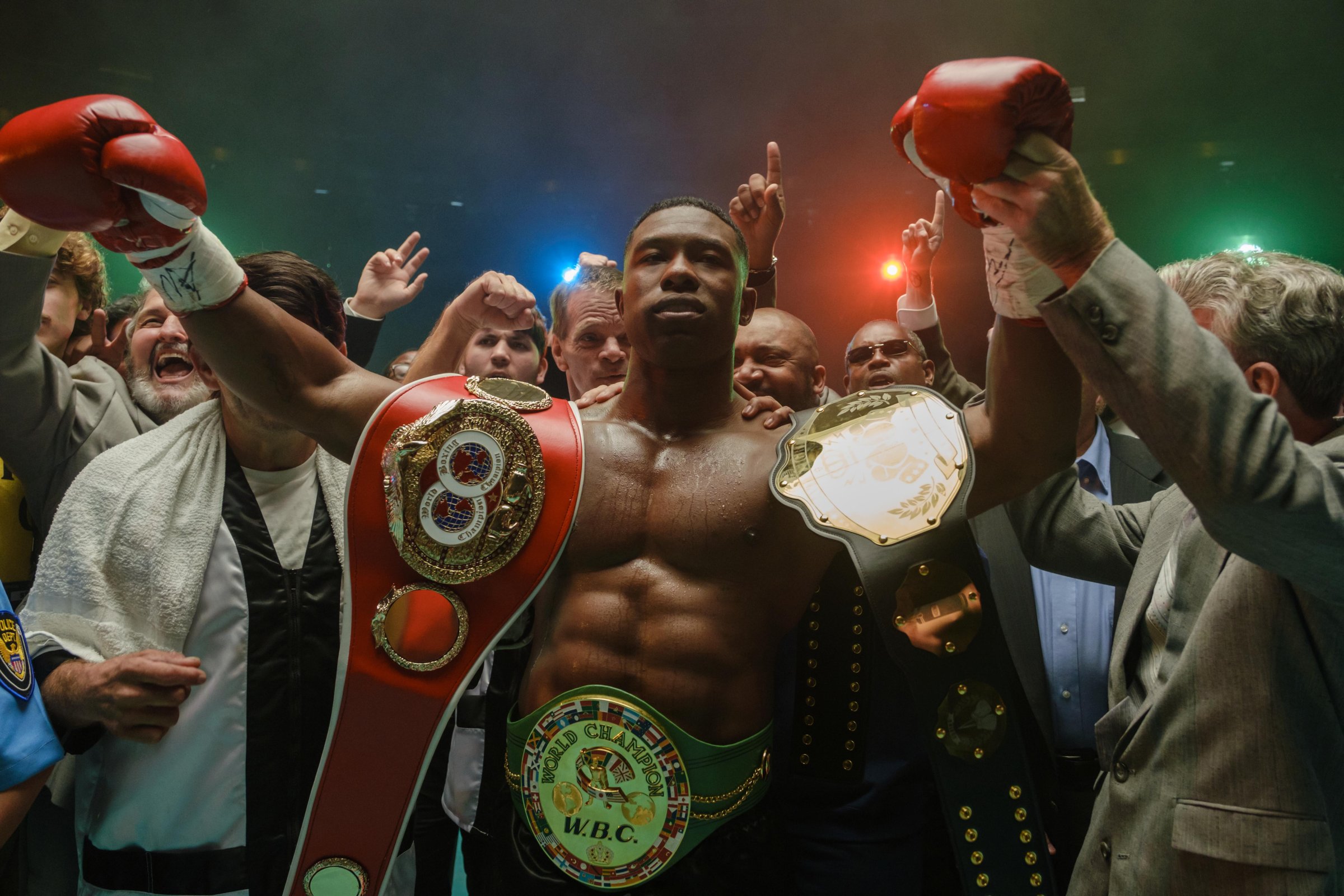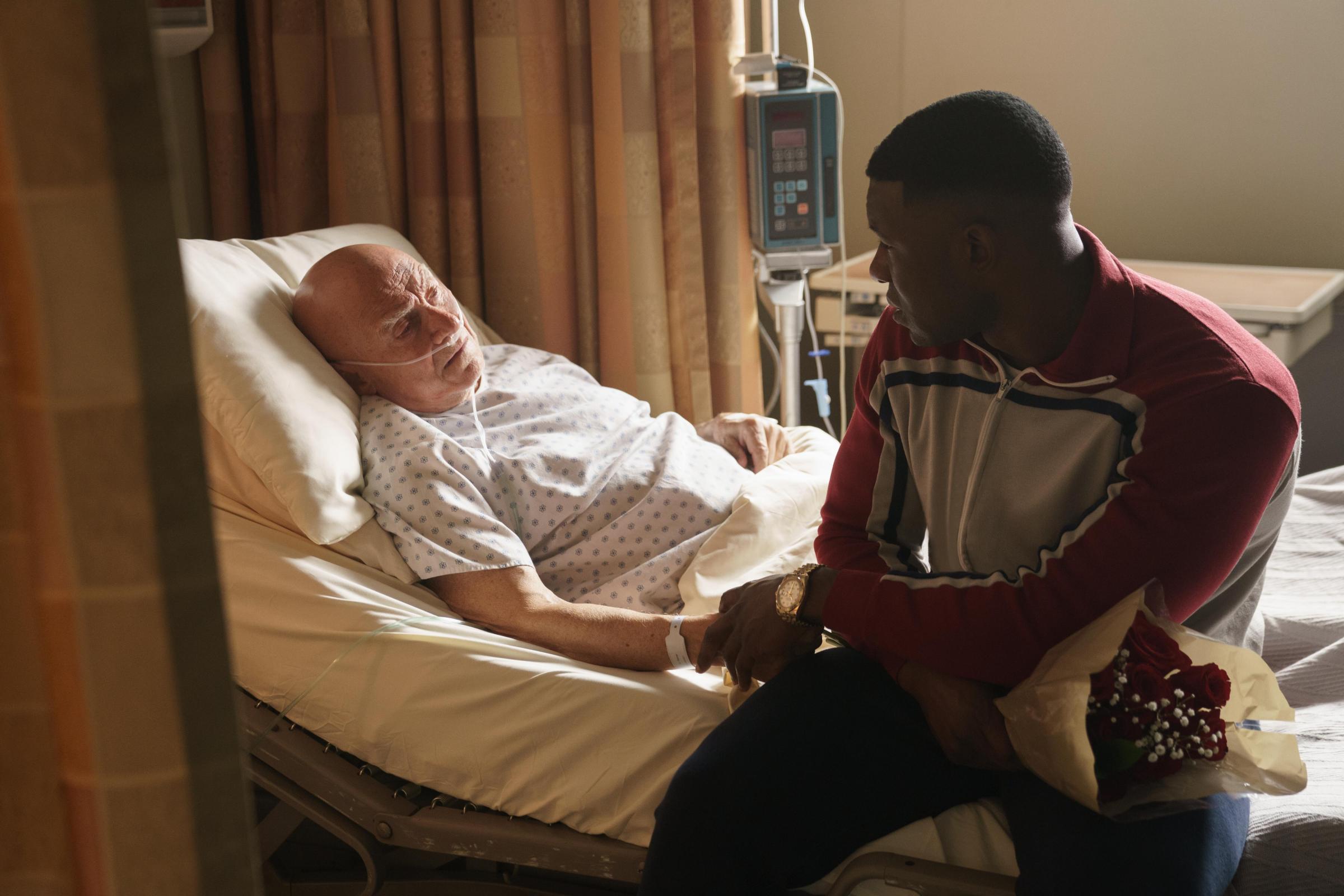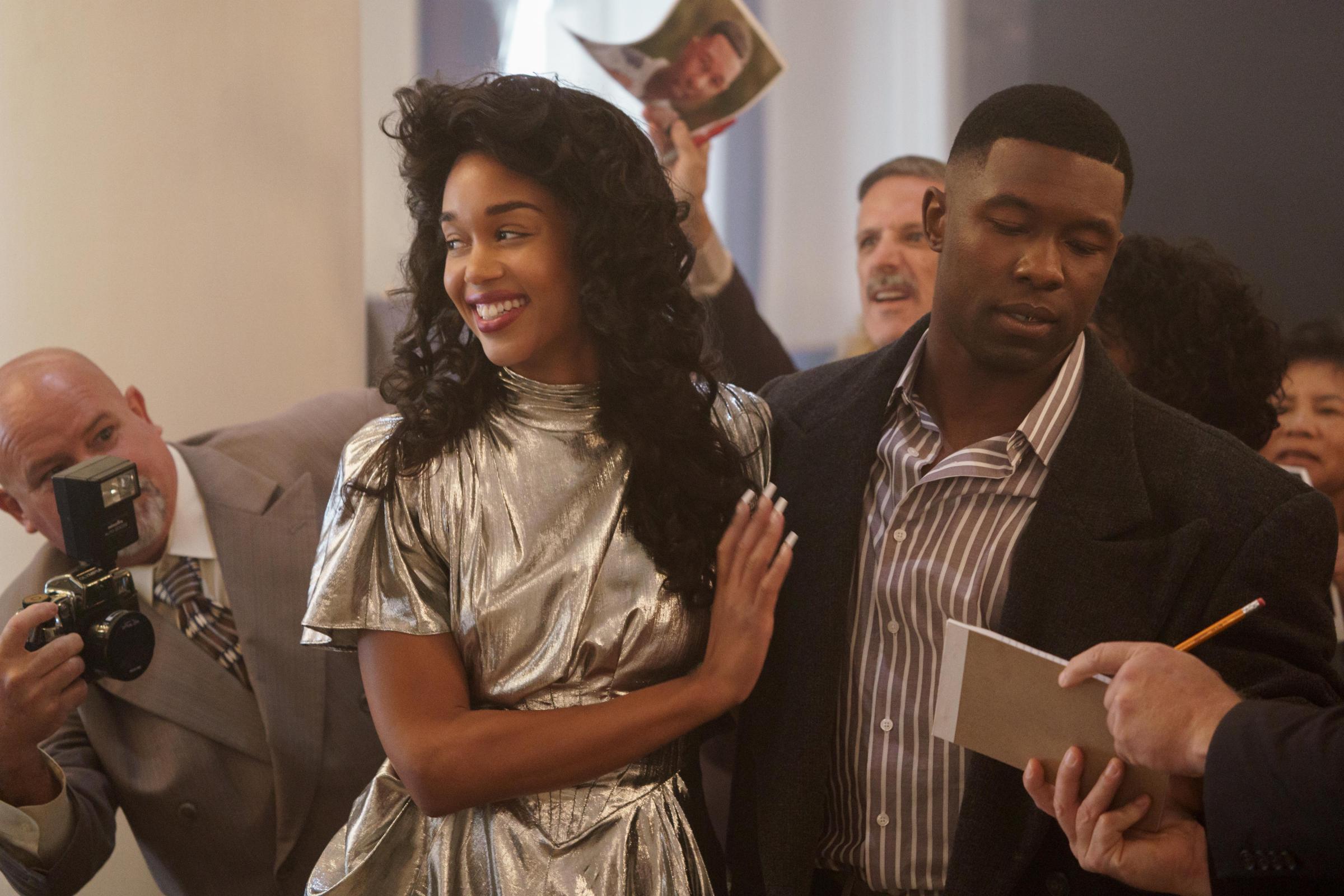
What is the meaning of Mike Tyson? Socially, historically, politically, for the sport of boxing and within Black culture—what do the long, messy career and unimpeachable icon status of a champion who is also a convicted rapist actually mean? Just because there can be no objectively correct answer to these questions, doesn’t excuse Tyson biographers in any medium from engaging with them. Anything less is a glorified Wikipedia entry. Which is pretty much what the makers of Hulu’s eight-part docudrama Mike have created.
The first mistake is to make Tyson—who has already published two autobiographical books, performed a one-man show on Broadway and HBO, and now hosts the podcast Hotboxin’—the narrator of his own story. Premiering Aug. 25, the miniseries uses a 2017 speaking engagement in Enid, Ind. as a framing device. Onstage, played by executive producer Trevante Rhodes (Moonlight) in a keenly observed performance that never verges on SNL-style parody, Mike presents a rough, standup-meets-TED-talk chronology of his life. As that history unfolds in flashbacks, viewers are treated to such bland insights as “I was just a weird little kid” and, in an apparently unwitting RuPaul homage: “When you hate yourself, you can’t love someone else.”
More from TIME
Tyson has been so famous, and notorious, for so long that anyone who is likely to watch Mike will probably go into it knowing many of the facts. Episodes of around 30 minutes speed through a bullet-point rundown of his impoverished Brownsville childhood, an early adolescence marked by petty crime, and a stint in juvenile detention upstate, where he learned to box, ultimately finding a surrogate father in his coach Cus D’Amato (an earthy Harvey Keitel). “You gotta be the meanest fighter God ever created,” Cus tells Mike, who seems to have trouble controlling his emotions. “No more crying. Intimidation. You’ve got to embrace your villainy.” The implications of a white man molding a Black boy into such a fearsome figure are left largely unexplored.

When his mother, best friend, and finally Cus die in quick succession, while Mike is still a teenager and his professional career is taking off, he’s left without anyone to trust. (Although his sister Denise, portrayed by Chedra Ariel, does get a few scenes, Tyson’s siblings play an inexplicably minor role in the five episodes screened for critics.) We watch old, white coaches and promoters pick his pockets—and then Don King (Russell Hornsby, deftly avoiding caricature) capitalizing on Mike’s disillusionment with those false friends to rob him blind. We watch Mike awkwardly and obsessively court his first wife, Robin Givens (Laura Harrier), while satisfying his carnal appetites with a comically bountiful supply of women. “I got a girlfriend!” he exclaims, after a phone call in which Robin agrees to make their relationship official. A naked woman emerges from his lap. “Not tonight, you don’t,” she quips, sucking on his neck.
There’s no way to responsibly consider Tyson’s legacy without digging into the intersection of race, gender, and celebrity culture. A rags-to-riches success story and a paragon of Black excellence in the ring, he used his power to injure, objectify, and malign Black women outside it. Creator Steven Rogers, who took on a similarly controversial athlete with more insight in I, Tonya, dutifully addresses this stuff. But in doing so, he retreats from any interpretation of the facts just when he should be offering perspective. The Givens portion of the story concludes with a VHS-blurry restaging of the shocking 1988 Barbara Walters interview in which Tyson’s then-wife sat beside him and discussed his violence towards her. Back to Mike in Indiana for the post-game analysis: “Robin beat me, and she did it in front of a national audience.” Depiction is not necessarily endorsement, but if Rogers intended to leave us with any greater perspective on the Tyson-Givens marriage, it doesn’t come through.
Meanwhile, the show engages in the kind of gleeful objectification that you’d think a drama so heavily focused on the rape and abuse of real women would take pains to avoid. Episodes are littered with the hot, nude, nameless groupies Mike is constantly bedding—at his home, in a Tokyo hotel, in the hot tub he has installed in his stretch limo. Mike doesn’t exactly deny that its subject is, among other things, a predator. It just makes him look like a pretty enviable one.

If the limitations of this approach weren’t obvious from the beginning, they become glaring by episode 5. Titled “Desiree,” it follows the harrowing ordeal of Desiree Washington (a devastating Li Eubanks), who was an 18-year-old Miss Black America contestant when Tyson raped her in 1991. There are no onstage jokes from Mike in this episode. (Tyson, who served less than half of his six-year sentence, has continued to paint her as a liar.) Instead, it’s Desiree—a sharp, sweet, ambitious young woman—who narrates, sometimes addressing the camera directly.
Liberating her from Mike’s framing constitutes a bare-minimum show of respect for the real Washington. But it also makes for a jarring shift in style and reveals how inessential the Indiana scenes are in the rest of the series. At the end of the episode, when onscreen text informs us that Washington has lived anonymously since the trial and never sold her story, you wonder about the ethics of putting words in the mouth of a survivor who just wants to be left alone.
Mike doesn’t quite apologize for Tyson, although it’s far more generous to him than you’d expect from an unauthorized bio-drama that the boxer has decried as Hulu’s “slave master take over story about my life.” An apology would require committing to a point of view. Instead, all the show really does is enumerate Tyson’s many conflicting reputations: Iron Mike and bullied little boy, sports hero and rapist, disadvantaged kid doing his best to survive and juvenile delinquent, hypersensitive man-child and remorseless predator. No subject should be off-limits for art, especially not an extremely public life like Tyson’s. But the price of telling this story is reopening, and in this case often trivializing, real people’s wounds. Mike never justifies the expenditure.
More Must-Reads From TIME
- The 100 Most Influential People of 2024
- Coco Gauff Is Playing for Herself Now
- Scenes From Pro-Palestinian Encampments Across U.S. Universities
- 6 Compliments That Land Every Time
- If You're Dating Right Now , You're Brave: Column
- The AI That Could Heal a Divided Internet
- Fallout Is a Brilliant Model for the Future of Video Game Adaptations
- Want Weekly Recs on What to Watch, Read, and More? Sign Up for Worth Your Time
Contact us at letters@time.com